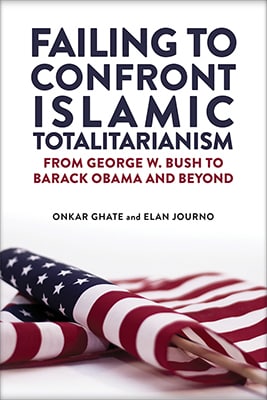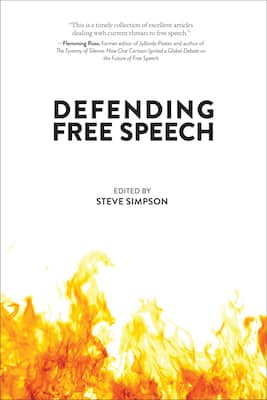One Small Step for Dictatorship: The Significance of Donald Trump’s Election
American exceptionalism is real.
The United States is founded on a political philosophy, and a profoundly revolutionary one at that. The Declaration of Independence expresses the viewpoint eloquently: that individuals possess “certain unalienable rights, that among these are life, liberty and the pursuit of happiness” and “that to secure these rights, governments are instituted among men, deriving their just powers from the consent of the governed.”
The Statue of Liberty symbolizes this vision, beckoning all who yearn to breathe free. The United States, having discarded most forms of tyranny, and having fought a bloody civil war over its toleration of the glaring, depressing exception of slavery, is more than the land of liberty. It’s a land where you shouldn’t even be able to imagine a dictator arising. The people will too jealously demand and too jealously guard their freedom.
Ayn Rand, in the late 1960s and early 1970s, in the midst of the nation’s political-cultural chaos, offered a fascinating comparison between the European and the American mind. “A European,” she wrote, “is disarmed in the face of a dictatorship: he may hate it, but he feels that he is wrong and, metaphysically, the State is right. An American would rebel to the bottom of his soul.”
No matter what the nation’s current problems, therefore, she said one thing is certain: “a dictatorship cannot take hold in America today. . . . Defiance, not obedience, is the American’s answer to overbearing authority.”
But, Rand cautioned, if “America drags on in her present state for a few more generations (which is unlikely),” the American spirit would further erode, and “dictatorship will become possible.”
On November 8, 2016, the United States took its first step toward dictatorship.
If that statement strikes you as blatantly false or as at best hyperbolic and unconstructive, I urge you to read on.
My argument is not that Donald Trump possesses the full mentality of a dictator. Some or even much of what he said during the campaign may perhaps have been in jest, a reality-TV personality’s attempt to shock, to entertain and to thereby gain billions of dollars’ worth of free media airtime. This appears to be Holman Jenkins’s reading in The Wall Street Journal. Trump, he writes, “was inventing almost daily a new episode of the 16-month Trump-for-president reality show to keep his audience from drifting off.”
You can also find family, friends and colleagues of Trump who attest that behind closed doors he is a different person, more measured, more thoughtful, more inquisitive, less bigoted, less prone to be triggered by the slightest of slights.
I admit that I have severe doubts about such a characterization of Trump. His Twitter rants; the fact that it is believable that the motivation for his run for the presidency was Obama mocking him at the 2011 White House Correspondents Dinner; the self-centeredness and second-handedness, in which he constantly compares himself to others; the sexism and the joking about sexual assault, or, obviously much worse, the actual committing of it; the demands for “loyalty”; the inability to admit his own errors and injustices, instead doubling down on his arbitrary assertions and attacks; his admiration for dictators like Putin; and his obsession with “winning,” with “getting even” and with maintaining a constantly evolving list of enemies; none of this generates confidence. But my argument does not hinge on Trump’s actual character, as awful as that may be.
Nor is my argument that Trump in office will be able constantly to wield dictatorial powers, however much he may desire to do so, as when he ominously threatens to trample on the First Amendment by persecuting media companies that disagree with him, like The Washington Post and its owner, Amazon’s Jeff Bezos. The original American structure of government, devised by giants like Madison and designed in part specifically to check the ambitions and powers of an aspiring dictator, will prove a bulwark. (Although admittedly today there exist many structural worries; Ezra Klein points to one non-obvious one.)
A Trump administration, if viewed out of the full context, may even enact some measures others and I would regard as positive, including improvements to the tax code and replacement of Obamacare with something less harmful. But it will be in the wrong way and for the wrong reasons. And even at this concrete level of policy, the Republican control of the presidency, the House and the Senate should give anyone pause who is concerned about, say, the campaign’s demonization of immigrants and of trade or the attempt to impose a Christian variant of Sharia law.
There is little doubt, for instance, that a Trump administration will try to appoint Supreme Court justices who, in defiance of the Constitution’s separation of church and state, will seek to undermine reproductive rights by imposing Christian religious dogmas on the country.
It is also important to recall that a king’s court is often more tyrannical than the king, whose public visibility often forces him to maintain a modicum of decency and justice. As of today, the talk is of appointing seasoned authoritarians like Rudy Giuliani and Jeff Sessions to positions of power.
But as destructive to freedom as I think a Trump administration is likely to be, this is also not my point.
My argument is that Trump publicly projected the mentality, methods and campaign of a would-be dictator—however much it may have been an act and however difficult it may be to enact specific decrees—and that he won the presidency because of this.
The issue is not Trump the person or what he might do to the country while in office. (Though these are important concerns.) The issue is what the success of his campaign reveals about the country.
It is of course true that not everyone who voted for Trump did so for identical reasons; indeed, many voters voted not for Trump but against Hillary, and there is ample reason to dread her ascendancy to the presidency.
But it is wrong to whitewash the campaign as Jenkins does in his article, calling Trump’s performance “the upbeat, improvisational show” most of his fan base “were waiting for.”
It is also wrong to think that the campaign’s success stems mainly from supporters’ reasonable responses to real grievances, among the most significant of which are the country’s ever-increasing economic controls, the conformist demands for political correctness and the failure honestly to confront Islamic totalitarianism.
Worries about economic controls and economic stagnation do exist, but there is much evidence to suggest they do not explain Trump’s support; here’s some of that evidence. Besides, Trump often implied a whole new set of economic controls on foreign trade, immigration and outsourcing. So the desire is to repeal controls supposedly unfavorable to “my people” (as Trump often refers to them) and instead impose crippling controls on others, labeled outsiders.
And in regard to the current problematic norms about political correctness and discussion of Islamic totalitarianism, what better way is there to convince sensible people across the political spectrum that these norms are in fact necessary, than Trump’s pronouncements about, say, Muslims, Hispanics and women’s genitalia? If Trump is what it means to face the threat posed by Islamic totalitarianism, who wants to go down that road? If Trump is what the absence of political correctness looks like, who wants to discard it?
The grim facts are that the campaign was designed to appeal to base sentiments and that it succeeded in major part because of this.
Consider some of the campaign’s mantras, slogans and strategies, which together echoed the methods and voice of dictators through the ages.
To begin, Trump painted a false picture of America, where everything is in decline and everything is a “disaster,” with no prospect of sunlight to dispel the darkness. To be sure, there are real and important problems in the country, but Trump spoke as if Silicon Valley and the age of the Internet had never occurred, producing previously unimagined products available to all Americans, even if their wages have stagnated. The progress in quality of life over the last few decades is real and widespread. It’s not as though only California, New York and the so-called elites enjoy iPhones, Google Maps, Netflix, YouTube, Uber, Airbnb and Facebook, leaving middle and rural America oppressed and desolate, like District 12 in The Hunger Games.
Next, and crucially, to this America engulfed in darkness, Trump offered up scapegoats responsible for our misery. Like communists demonizing the bourgeoisie, Nazis demonizing the Jews, socialists demonizing owners of private property, and egalitarians demonizing the one percent, Trump demonized Hispanics, immigrants, journalists, free traders, elites, Muslims (all Muslims, not just supporters of Islamic totalitarianism), the “mainstream” media, among other groups. They, he said or implied, are the source of all of our struggles. Get rid of them, and America gets rid of all her problems.
How are we to get rid of this sundry list of scapegoats? Through political power. More precisely, by handing Trump whatever political power he deems necessary to make America great again. He, somehow and singularly, knows what to do. “I alone,” Trump declared, “can fix it.”
What would Trump do in power? No one knew, including Trump and his supporters. He said he would negotiate and deal with everyone on everything. All any of us could know is that, somehow, these would be the greatest deals we had ever seen. Trump has no abstract, political principles or even any firm policies or political views. And when he spoke of specific actions he would take, which themselves were often inconsistent with one another, few of his supporters actually believed him. A small sampling: he would build a wall across the entire U.S.-Mexican border and, somehow, make Mexico pay for it; he would, or maybe he wouldn’t, withdraw from NATO; he would be mercilessly tough with Putin and simultaneously have a great relationship with him—in fact, maybe it would be good if Russia electronically hacked America even more; he would, or maybe he wouldn’t, ban all Muslims from entering the country.
Billionaire Peter Thiel, a Trump supporter, stated it perfectly as he reiterated the formulations of some earlier commentators: those “who vote for Trump take Trump seriously but not literally.” This indeed is what Trump’s campaign seemed to expect of its supporters. It is also what every dictator expects.
Trump in his campaign projected himself as unconstrained by any previous statements or commitments he had made, unconstrained by any facts, unconstrained by the truth. This was not just the routine flip-flopping of today’s politician. A presidential candidate who regularly indulges in conspiracy theories like the birther smear of President Obama is in a different and new league. A candidate who, after the disturbing recording of his disgusting remarks to Billy Bush surfaced, can go on television before millions of Americans and declare that “no one respects women more than me, no one,” projects a special pride in being above the facts, which limit other mortals but not him.
And too many of Trump’s supporters, driven by fears that he himself had helped inflame, and fixated on scapegoats, admired him for precisely this attitude.
Most political campaigns today are vacuous. Think of Obama’s slogans of hope and change. What kind of change? Change you can believe in. But Trump’s campaign was of a different order. Trump would drain the swamps, smash a rigged system, and make America great again. How would this dramatic upheaval occur? Trump consistently and proudly defied the need to be pinned down by anything, including the platforms and positions of the Republican Party. When Trump answered to the question of whether he would accept the election’s result if he were to lose, that America would have to wait and see, he captured the entire flavor of his campaign. Hand Donald Trump power—and wait to see what he does with it. As Jenkins encapsulates it, Trump’s “platform comes down to ‘trust me’—a remarkable mandate if you can pull it off.”
But this is not a mandate. It is the demand for a blank check on political power, a check which heretofore Americans had been unwilling to sign. Not this time.
The fact that Trump will be unable fully to exercise this power does not change the nature of the demand or of the grant.
Even more worrisome, this follow-the-leader authoritarianism is not a disease confined to Trump’s campaign, to the Republican Party or even to the so-called right. It appears to run deep in the veins of the country, infecting also independents, Democrats and the so-called left. It was clearly discernible, for instance, among some of the fervent supporters of Bernie Sanders.
Writing in January 2016, a student of political science warned that Trump’s support had likely not crested because of widespread authoritarian sentiments in the American population, including among Democrat-leaning and independent voters. (The proxies these political scientists use to measure authoritarianism are certainly debatable.)
Perhaps the most disturbing poll of the election came out in April 2016. In a Quinnipiac University National poll of registered voters, when asked whether “America needs a powerful political leader that will save us from the problems we face,” a majority, 54%, strongly agreed, and 26% somewhat agreed. For those leaning toward Hillary, it was 45% and 29%; for those leaning toward Sanders, 43% and 32%; and for those leaning toward Trump, 83% and 13%. When asked whether “What we need is a leader who is willing to say or do anything to solve America’s problems,” 27% of registered voters strongly agreed and 26% somewhat agreed. For those leaning toward Hillary it was 20% and 17%; for those leaning toward Sanders, 17% and 25%; and for those leaning toward Trump, 54% and 30%.
Pause on those numbers. Let them sink it. And then let me offer two incidents that I think drive home the meaning of those numbers.
In November 2015 I spoke at an ARI-sponsored event during AM560’s Freedom Summit in Chicago, which attracts fans of talk radio; Ann Coulter and Sean Hannity were among the headliners. An informal poll of attendees at the start of the conference indicated that about 40 percent were supporters of Trump. I spoke about immigration. Early in my talk I mentioned Nancy Pelosi’s incredulity when she was asked where in the Constitution is Congress granted the authority to enact an individual health insurance mandate; her response to the questioner: “Are you serious?” The anecdote drew laughter. A few moments later I asked where in the Constitution does it authorize building a wall to keep out immigrants whom Americans want to hire. At that point all hell broke loose.
Some members of the audience stood up and started reciting speeches to try to drown me out, and many others shouted and jeered. At one point a woman, looking me up on the Internet, asked me if I was Canadian, to which I replied Yes; she proceeded to declare to the crowd something to the effect of “Why should we listen to him, he’s an immigrant from Canada!” (I politely inquired whether she thought the validity of my argument depended on the color of my passport.) A few people in the audience were scared for my safety and contacted hotel security. Immediately after the talk a few embarrassed members of the audience came up to me and said that the crowd’s reaction reminded them of the behavior of spoiled college students, behavior they all supposedly decry. Indeed, the only other times I have encountered such mindless opposition is on some college campuses when speaking about the Danish Cartoons crisis and Islamic totalitarianism.
Now the second incident. In January 2016 at a campaign stop in Sioux Center, Iowa, Donald Trump half joked that he has “the most loyal people. . . . I could stand in the middle of Fifth Avenue and shoot someone [an immigrant? a journalist?] and I wouldn’t lose any voters, okay. It’s like incredible.”
Although the audience laughed, it was no joke. Perhaps more than anyone else, Trump understood the special nature of much of his political support. To those clamoring for a leader who will say or do anything to save them, he promised to play the role.
This is what it looks like for a growing portion of the populace to be ready to welcome a dictator.
What this election exposes is that the distinctively American spirit, which would brook no tyrant, has, as Ayn Rand feared, continued to erode.
The causes of the erosion, all philosophic in origin, are numerous. Too many of us today are uneducated or mis-educated, deceived by anti-Enlightenment ideas that have now been dominant in our educational institutions for more than a century. “Knowledge is power,” said Francis Bacon. This is profoundly true. It is only genuine knowledge of the world and of the self that gives us a sense of control over our own lives and confidence in planning and achieving our own path to happiness. But with too many schools devastated by progressive education, too few of us achieve this intellectual state. And even if we try, when we reach college age we are met all too often with multiculturalism and other theories that teach that our identity comes from membership in some group and that, powerless, our fate is actually determined by forces outside our control. The doctrines of collectivism and determinism are the fertile ground that scapegoating requires.
“We couldn’t help it!” the various versions of determinism encourage us to plead. If only the external factors that are responsible for wrecking our lives and country were eliminated—the bourgeoisie, the Jews, immigrants, bankers, the one percent—all would be well. It’s no accident that it was not free will, reason and individualism that the tyrannies of the twentieth century preached, but some form of racial, ethnic or economic collectivism and determinism.
With American educational institutions no longer teaching the Enlightenment foundation of America, the major way the American spirit endures is through the practice and love of business. “The chief business of the American people,” Coolidge rightly said, “is business.” What area of the country—not in expressed viewpoint or political affiliation but in spirit—is more quintessentially American than Silicon Valley? The optimism, the dynamism, the initiative, the merging of abstract theory with money-making practice, the can-do attitude and the calculated risk-taking that the Valley encourages and rewards—this is the spirit that made America the world’s leading nation.
But this vitality is now concentrated in Silicon Valley and the technology sector because too many other industries and areas of the country and of life are controlled by the regulatory-welfare state. Hemmed in by the FDA, the FCC, the SEC, the EPA, and the rest of the alphabet soup of regulatory agencies, too many of us genuinely feel out of full control of our lives. And coddled by the welfare state, too many of us fail to develop a robust sense of personal responsibility and pride in the most life-affirming of activities: productive work.
There is a further important cause that we must be willing to face: religion. Most analysts expressed bewilderment at the considerable support that Trump received from evangelicals. If you conceive of the appeal of religion as primarily doctrinal—that followers have been persuaded that their religion is true and that the doctrines of other religions are false—the support is bewildering, because Trump didn’t share many of their particular dogmas. But if you recognize that the attraction of religion stems much more from the mentality it encourages and the psychological environment among believers that it fosters—if you recognize that the particular dogmas are almost accidental, that, for example, most evangelicals would be Muslims if born to Muslim parents or born in a Muslim-majority country, and vice versa for most Muslims—then Trump’s allure to evangelicals should have been expected.
Trump’s call for blind, unquestioning followers, his trafficking in conspiracy theories and disregard for facts and science, his claim that we are close to the end of days and that he, unerring and alone, can save us, his promise of miracles like building a wall and making Mexico pay for it—all of this and more should be seen as attractive to a religious mindset, especially of a fundamentalist variety. The content of Trump’s comments was not unimportant, particularly his list of enemies and scapegoats, but nor was it the primary source of his appeal.
And the fact is that this growing religious mindset is incompatible with the American spirit of independence and individualism.
But although these and many other forces have contributed to the erosion of the American spirit, it is not gone. Running against, in Sam Harris’s words, such “a terribly flawed candidate” as Hillary, against whom many people were voting, Trump did not win the popular vote. More importantly, Donald Trump and Hillary Clinton, from virtually all reports, were the most despised candidates and choice for president in recent American history. This is good news. It offers hope for a brighter future.
The success of the Trump campaign will no doubt make the journey harder. It will make it even easier to dismiss truly pro-freedom, pro-American self-defense positions as bigoted and anti-intellectual. And just as the creeping authoritarianism of the Obama administration helped pave the road for Trump, and as the Republican Party’s embrace of religious fundamentalists encouraged the Democratic Party to also get religion and bring it into politics, so now the Republican Party’s embrace of a demagogue will encourage the Democratic Party to run similar candidates. There were elements of demagoguery in Sanders’s campaign and in the blind infatuation of many of his supporters, and one lesson the Democratic Party is likely to draw is that Sanders had a better chance of defeating Trump than did Hillary.
But for any admirer or fan of Ayn Rand’s vision and ideas, the job ahead is clear. We need to help both ourselves and our fellow citizens grasp, when so many of us are disillusioned but not yet ready to succumb to dictatorship, that we can solve our own problems. There is a better way, there is a shining, positive vision for America offered in the pages of Atlas Shrugged.
To attain it, we need to discard the empty slogans of the Republicans and the Democrats and to replace today’s intellectual bankruptcy with real ideas. There are many Americans fed up with the tribal, regressive nature of so much of the right and left. What we all need to gain is a deeper, fuller understanding of the idea of America and its philosophic roots in the not-yet-fully-realized promise of the Enlightenment, the Age of Reason.
The task ahead is a long-term and educational one. Nobody said it would be easy. It is, perhaps, harder than anyone of us had thought.
But it wasn’t easy to create America, either.
That noble idea should remain a beacon. In Ayn Rand’s final words of advice, “Don’t Let It Go.”
Image: “Make_America_Great_Again_hat_(27149010964).jpg” by Gage Skidmore [CC BY-SA 2.0] via Wikimedia Commons / Cropped from original










